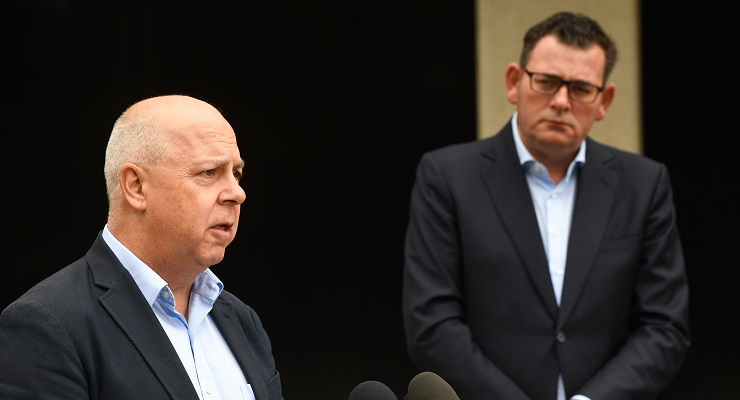
Tomorrow, the Victorian government will deliver its most important budget since WWII. After one of the toughest years in the state’s history, with support for Labor remaining strong and with fewer limitations on running up deficits, Premier Daniel Andrews and Treasurer Tim Pallas have an unprecedented mandate to spend big.
The question is… on what?
A few teasers have been drip-fed to the media, including much-needed funding for social housing, clean energy and more. But these worthy investments, much like Andrews’ broader approach, leave one gaping hole.
All are highly visible, popular and “announceable” projects — but behind the press-conference stage, cracks remain in our state’s basic faculties.
The Andrews government has pioneered some nation-leading reforms, but the public sector it commands remains crippled by decades of hollowing out. Australia’s “progressive state” is trying to hit sixes with a broken bat.
Still recovering from the Kennett revolution
Bloviating interstate commentators might assume that the Victorian public sector’s problems kicked off when they started paying attention around June — but locals know this is a much longer story.
In the 1990s, our state’s economy was radically transformed by the Kennett government, whose policies were “of revolutionary intent and effect”. This entailed the privatisation of many public sector assets, the shrinking and corporatisation of the public sector, more private contracting and business-like public management trumping technical expertise.
Subsequent governments modified but ultimately abided many of these policies. The government’s robustness and capacity to effectively respond to crises were severely undermined and are yet to fully recover.
Enter Dan, the noble show pony
Andrews sold himself as a rejection of neoliberalism, recommitting to an activist government that would “get things done” and depicting his predecessors Ted Baillieu and Denis Napthine as “do nothing” leaders.
He prioritised impactful, “big splash” promises like major infrastructure builds. He created mission-oriented government agencies to deliver these promises, such as the Level Crossing Removal Authority and School Building Authority, and emphasised their completion with his oft-repeated slogan: “say what you do and do what you say“.
Whether Andrews was substantively or merely performatively different to his forebears remains fiercely contested. Despite some notable inconsistencies, I am inclined to give Andrews more credit than his detractors in recultivating a political settlement in which voters expect their state government to act decisively, and revile a laissez-faire vision of deliberate state absence.
Witness the weary Victorian Liberals, who are currently languishing for championing the same “small government” rhetoric that Kennett extols.
But while Labor’s approach has helped restore Victorians’ faith in government action, its Achilles’ heel has been the deprioritising of repairing the less visible issues in the Victorian public sector that were less relevant to the government’s core promises.
In seeing the public service as a vehicle to get from A to B, Andrews forgot that the engine was overdue for a service.
Contract tracing
This came back to bite him when the coronavirus exposed the under-resourcing of our health bureaucracy. The Department of Health and Human Services had recently been subjected to an “efficiency dividend” (read: cut), and our public health team was badly under-resourced. It was belatedly patched up with private contractors when the pandemic exposed its weaknesses.
The failures in hotel quarantine also underlined the extent to which public servants were hastily bolting together hodgepodges of public and private units.
These failures should serve as a wake-up call for every Andrews government minister: audit your departments and clean up anything you might have overlooked or ignored. I doubt the public will be so forgiving of another own-goal.
The ‘progressive state’ needs a progressive state
The state government cannot survive on too many flashy forward pockets and too few solid defenders. As the pandemic has shown, you cannot overemphasise your priorities without sufficient backstops in case something goes awry.
Having cultivated the expectation among voters that government will once again be a potent force for good in their lives, Victorian Labor could fail their own test if the machinery of government is so gummed up with shoddy contracts and burned out teams that it cannot perform foundational tasks like keeping the community safe, and thus drawn-out inquiries distract from their preferred reforms.
In a defining year in Victoria’s history that will reshape residents’ lives far into the future, it’s time we finished the job of filling the gaps in our state’s core faculties — lest the “great rebuild” promised in Tuesday’s budget spring leaks in years to come.








The evil men do long outlasts them.
eg Kennett & Howard.
It’s amazing the ongoing impact Kennett has had in Victoria. The Government has slowly been reopening a slate of schools the man shut down 20+ years ago. It feels like we’re just coming out of the damage.
I think Andrew’s is a good position to go big. The Victorian Liberals are a hot mess, with their only policy announcement of late being the East-West link, again.
Though 100% right. Andrew’s want the mantle of most progressive state, then he actually needs to mean it. Finally break the back of the law and order BS that dominates our state politics and stop building bypasses through sacred sites would be a good start.
These are the long term consequences of decisions made 25 years ago. The decision makers are long gone from public life. Loud mouth Kennett is still remembered, but who remembers his henchmen: Stockdale, Gude, Knowles, McLellan.
Last summer gave us an insight to the consequences of privatising the SEC. No planning for the replacement of clapped out power stations over the 25 years since privatisation, simply relying on the market to build replacement capacity. Blackouts avoided by relying on renewable energy supplied from SA via the interconnector.